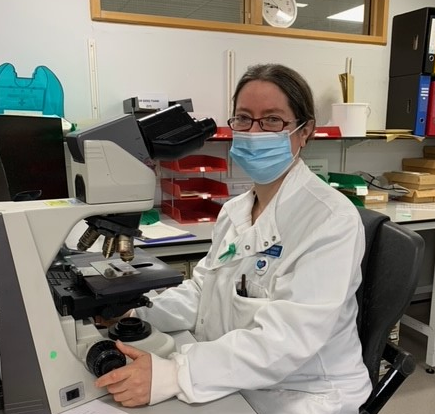Publish date: 24 June 2021
Biomedical scientist, Heather Farrimond, shares what it's like working in the histology labs on Biomedical Science Day.

My name is Heather Farrimond and I’m a biomedical scientist in the histology (aka histopathology) lab at North Tyneside General Hospital. I’ve worked here for six years now, but have been in this profession since 1999.
It’s Biomedical Science day today (#attheheartofhealthcare #biomedicalscienceday2021) so I thought you might like to know a bit about what we do here.
In histology we look at tissues, so any biopsy you might have had, either in hospital or at your GPs surgery, or if you’ve had an operation to remove your appendix or gallbladder, or a bigger procedure to take out part of your colon or remove a breast…it all comes to us.
We don’t rely on computer-based analysers like some of the other labs, but have to use a lot of skill and experience, everyone’s unusual mole looks a bit different! We take samples of your tissue, take measurements and note any abnormalities, then take very thin slices to look at down a microscope.
Our medical colleagues, the pathologists, look at those tissue slices, stained with a variety of dyes and antibodies (depending on what we think the problem is) and make their diagnosis. They can tell your doctor what sort of disease (or what type of tumour) you have, whether it is likely to spread, and whether the whole of it has been removed. Often, they are able to tell you that there’s nothing to worry about!
We’re currently having our busiest time ever! Clinics and surgeries are running so many sessions to make up for cancelled appointments in the pandemic that we’re seeing more specimens than we have ever done before. Biomedical scientists, lab assistants and pathologists are all working flat out to keep our turnaround times as low as we can, to enable you to get the peace of mind, or the treatments you need.
My job is very fulfilling as I know that I’m an important part of the pathway to diagnosis for a massive number of patients. We treat every specimen with care as we know someone is waiting to find out what is wrong with them, what treatment they should have, or to have their mind set at rest.
To become a biomedical scientist you need an Institute-accredited degree in Biomedical Science (locally there are courses at Northumbria and Sunderland Universities) and you undertake a portfolio after that to become registered. If you have a different degree you can sometimes ‘top up’ with extra modules and start from there.
If you want to know more about Biomedical Science then have a look at www.ibms.org.
